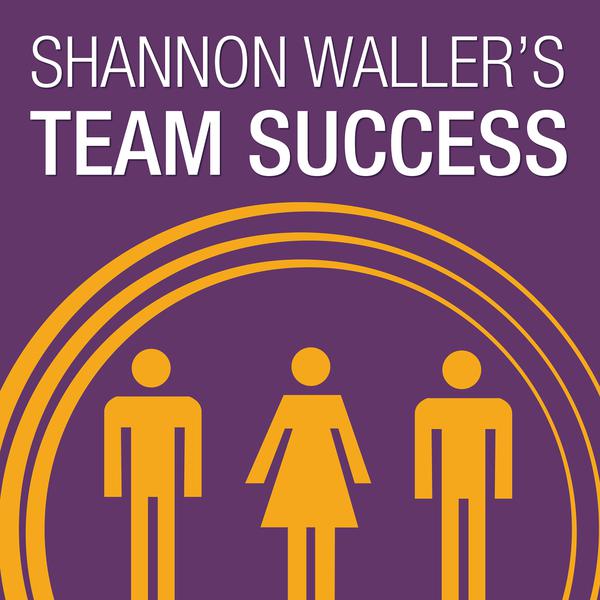
Shannon Waller's Team Success
Shannon Waller - Strategic Coach
Shannon Waller, author of The Team Success Handbook, has been the entrepreneurial team expert at Strategic Coach® since 1995. Shannon Waller's Team Success podcasts are a series of insights around teamwork and success.
- 50 minutes 36 secondsFinding Your Right-Hand: The Essential Guide To Number Two Leaders, with Alec Broadfoot

Do you understand the transformative power of hiring the right number two leader? In this episode, Shannon Waller and Alec Broadfoot discuss the essential qualities of an effective second-in-command and the critical role of a structured interview process in identifying top talent. Learn how assessments and strategic questioning can improve your hiring strategy and drive lasting success.
Show Notes:
- Understanding the role of a number two leader is crucial for entrepreneurial success.
- Hiring the right second-in-command can significantly improve your business operations.
- Most entrepreneurs face people problems, not process problems.
- A number two leader should oversee daily operations, freeing up visionaries to focus on their areas of Unique Ability®.
- The right number two leader will thrive on the challenges that visionaries find tedious.
- Letting go of certain responsibilities can lead to increased joy and energy for visionary leaders, ultimately driving profit.
- The Talent Impact Profile™ (TIP) is a valuable tool for identifying the right characteristics in a number two leader.
- Building a strong partnership with your number two can transform both your business and personal life.
- A structured interview process is essential for identifying the right number two leader.
- Common mistakes in interviewing include relying solely on “gut” feelings instead of data-driven insights and ignoring cultural fit. Candidates need to align with your company’s values.
- The best time to fire a poor performer is during the interview process.
- The average interview predicts success about 14% of the time, but using an assessment tool can raise your success rate to upwards of 52%.
- Once they’re hired, it’s crucial to provide the new leader with ongoing support and clear expectations to ensure they can thrive in their role.
Characteristics of a successful second-in-command:
- Strategic thinking: The ability to think critically and plan effectively.
- Planning and organization skills: A knack for creating and implementing processes.
- People orientation: A focus on developing and nurturing team members.
- Coaching ability: Enjoyment in holding others accountable and managing performance.
- Strong communication skills: The capacity to convey information clearly and effectively.
- Right fit: Compatibility with your company culture and values.
Resources:
Hiring Your Right #2 Leader by Alec Broadfoot
How The Best Get Better® by Dan Sullivan
The Team Success Handbook by Shannon Waller
13 February 2025, 2:55 pm - 11 minutes 14 secondsBe Partners: A New Standard For Teamwork
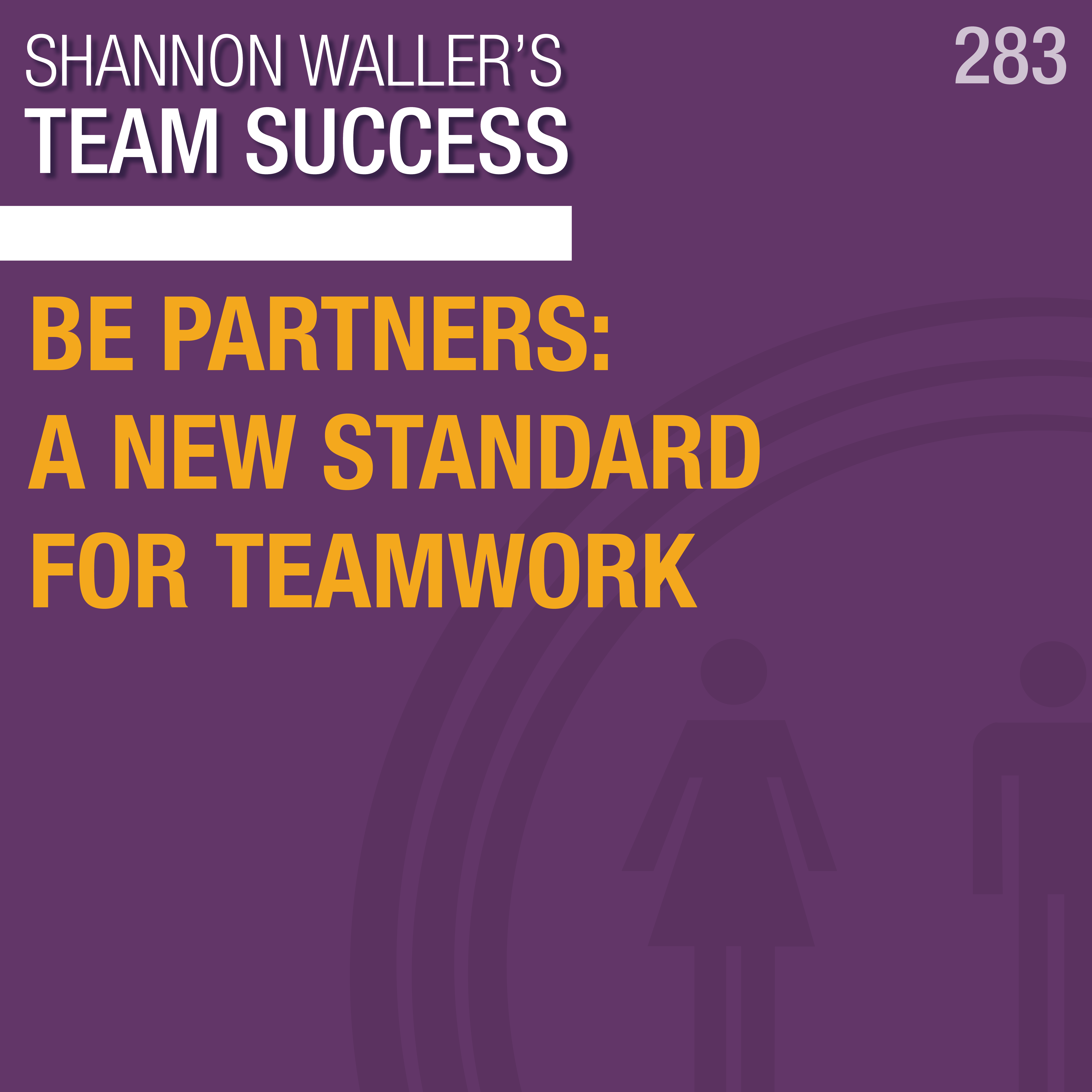
Are you looking to upgrade your teamwork? Do you realize that you have really high standards? Today, Shannon Waller talks about building partners within entrepreneurial teams. What does it mean to have team partners rather than employees or staff, and how do you build the ultimate dream team in your business? If you’re tired of micromanaging, find out how Shannon achieves crazy fast results with team members who act as partners.
Show Notes:
- Shannon has realized she only wants to work with partners, not employees, not staff.
- One example of a three-way partnership is the Teamwork Triad, which consist of three people who have a Unique Ability® in separate but equal areas of “make it up” (creative vision), “make it real” (execution), and “make it recur” (sustainability).
- Great partnerships are built around each person being honest about their strengths and areas of Unique Ability.
- Unique Ability is made up of those activities at which you are capable and confident, but also most love to do.
- Do you know what you’re uniquely exceptional at that you should be doing all the time? Do you know what you should not be doing?
- Having Imposter Syndrome simply means you’re growing and still somewhere in the first three scary stages of The 4 C’s Formula®—commitment, courage, or capability—and not yet at the last stage, confidence.
- To be a great partner, you can’t be shy and humble about the things you’re really good at.
- You can’t be a partner when you’re doing what you’re incompetent or merely competent at.
- You also can’t be a partner when you’re doing what you’re excellent at but have no passion for.
- When partners work together in Unique Ability® Teamwork, everyone is committed and energized by what they’re doing.
- How can you tell when you have the right partners working together? You get the highest quality results at crazy fast speeds.
- Being a partner means stepping outside of your preconceived ideas about your role to share the best of yourself: your heart, brain, and will.
Resources:
The Team Success Handbook by Shannon Waller
The 4 C’s Formula by Dan Sullivan
30 January 2025, 2:29 pm - 19 minutes 38 secondsThe Power Of Documenting And Communicating Your Processes
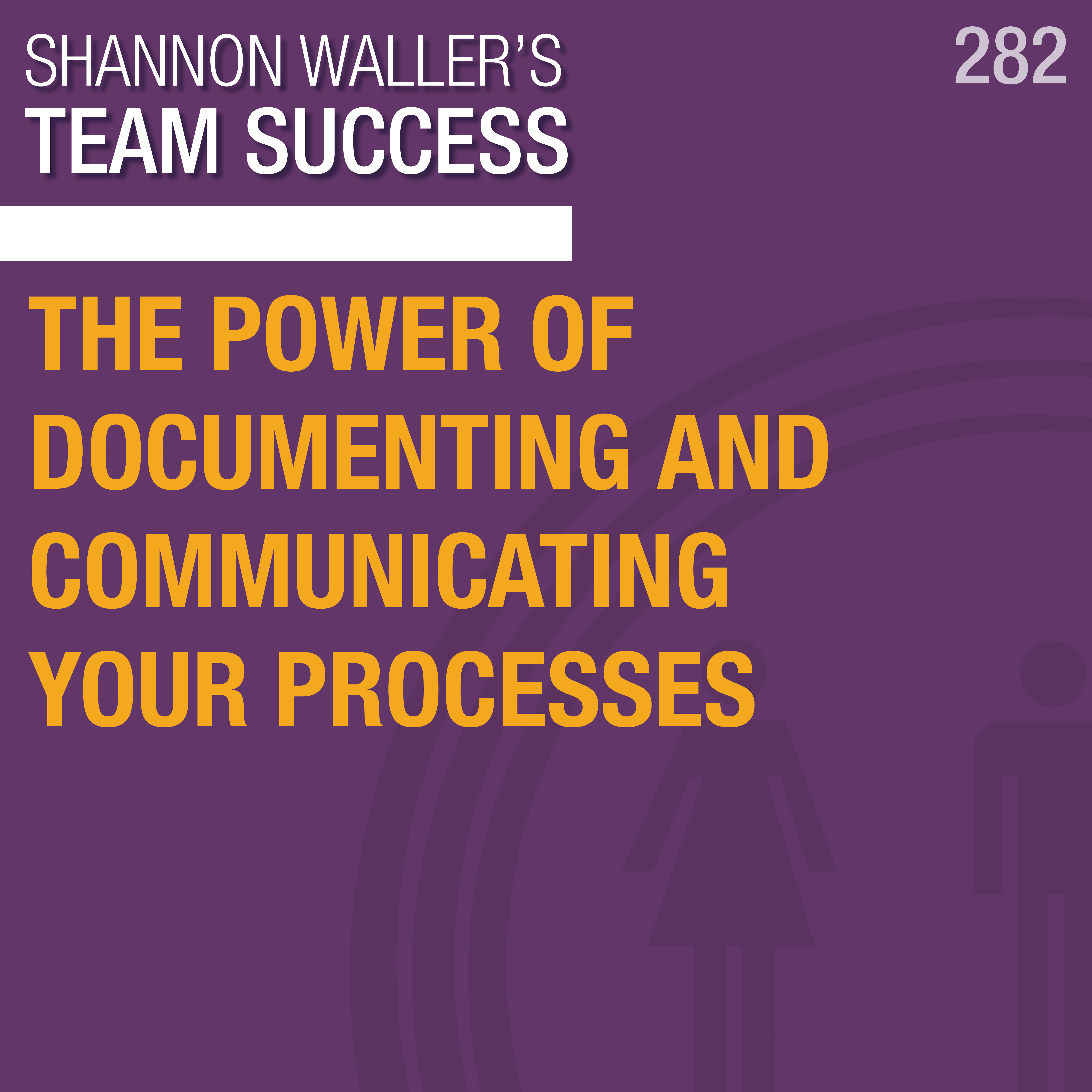
Are your business processes slowing you down? In this episode, Shannon Waller reveals how to revamp and revitalize your workflows for better results. Learn the importance of documenting processes, assigning the right people to tasks, and setting clear expectations, and discover how small changes can lead to big improvements in efficiency and motivation.
Show Notes:
The Importance Of Documenting Processes
- Document and communicate processes clearly to eliminate bottlenecks and misunderstandings.
- Regularly review and update processes to adapt to changes in technology, market, or team composition.
Tools And Visualization
- Use a simple flowchart to visualize and optimize workflows.
- Think of processes as a relay race, focusing on smooth handoffs between team members.
Process Improvement Strategies
- Identify areas where processes are creating friction or frustration, and prioritize these for improvement.
- Aim to make processes faster, easier, cheaper, and with a bigger impact through collaborative problem solving.
- Be open to completely overhauling a process if it’s not delivering results or if team members are disengaged.
Team Alignment And Roles
- Ensure the right people are in the right roles for each step of your processes, aligning with their Unique Ability®.
- Be specific about timing expectations for each process step to maintain momentum and avoid delays.
Communication And Expectations
- Clearly articulate expectations, including deliverables, quality standards, and deadlines.
- Document successful processes and make them accessible to the team for future reference and training.
Real-World Application
- Example: Shortening a 12-week process to three weeks by involving new team members and incorporating new technology.
- Focus on creating win-win situations where team members enjoy their roles and processes are optimized.
Resources:
Process! How Discipline And Consistency Will Set You And Your Business Free by Mike Paton and Lisa González
16 January 2025, 2:39 pm - 22 minutes 3 secondsThe Hidden Cost Of Guilt In Leadership: How To Break Free And Thrive
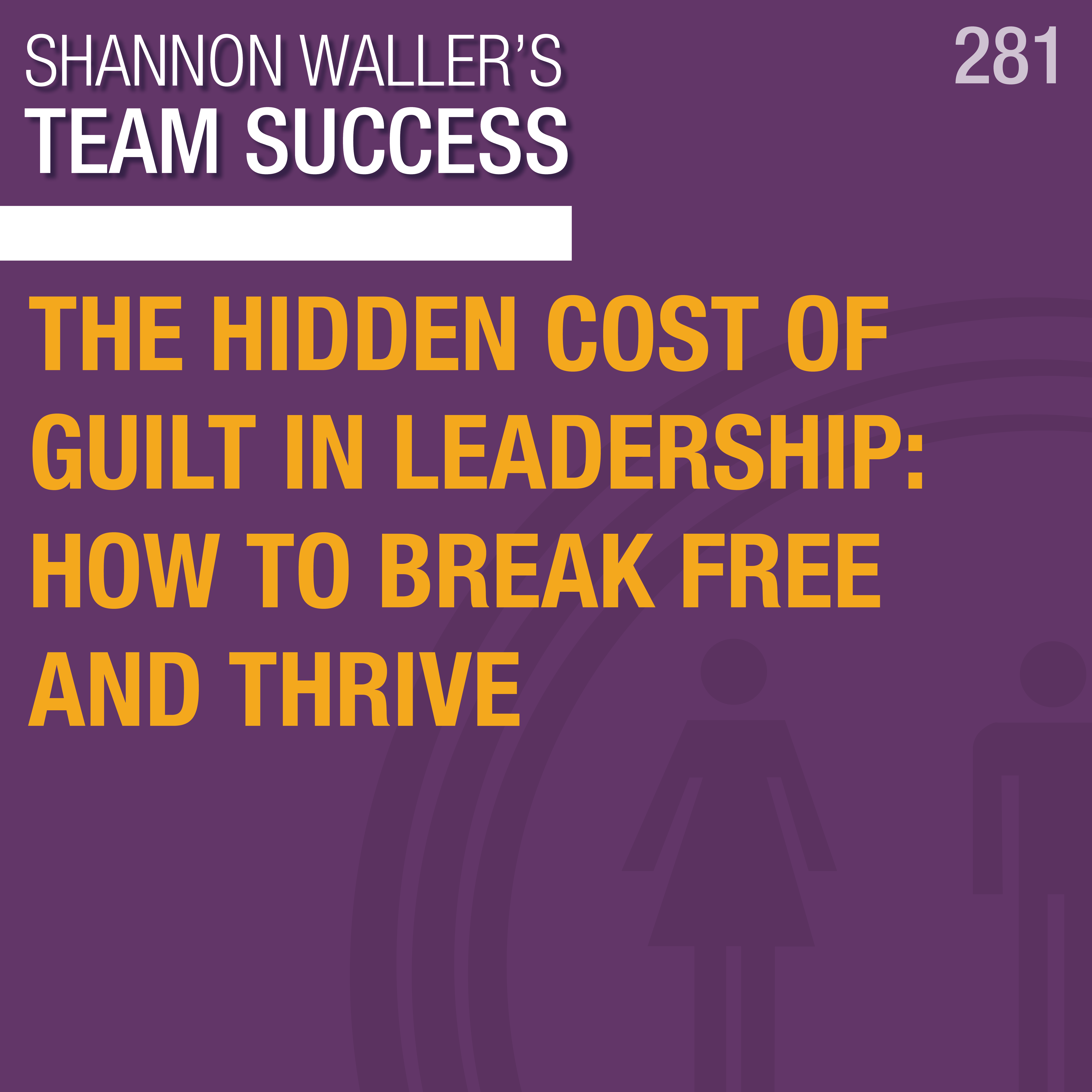
Do you take the time to acknowledge your team’s contributions, or do you overlook their strengths? In this episode, Shannon Waller explores the transformative power of genuine praise in the workplace. Discover how effective recognition can improve team morale, fuel innovation, and drive overall success in your business.
Show Notes:
- Is guilt a necessary emotion, or is it just a societal construct that holds us back?
- Entrepreneurs can get overwhelmed because they hold on to tasks they feel guilty about delegating.
- Take notice of people who are isolating themselves: are they feeling remorse, regret, or shame?
- Excessive or misplaced guilt leads to negative self-perception and stress without resulting in constructive change.
- Is misplaced guilt preventing you from taking positive action and making progress?
- To avoid situations that will lead to guilty feelings, stay away from commitments where you cannot easily deliver on what’s needed—in other words, stay within areas of your Unique Ability® and strengths.
- Learning about herself through her Kolbe, PRINT®, and CliftonStrengths® profiles has directed Shannon toward areas that result in more productivity, more profitability, and creating more value.
- Common triggers include failing to meet personal or professional expectations and neglecting personal well-being in favor of work commitments.
- Cultural and societal factors contribute significantly to feelings of guilt, often rooted in childhood experiences.
Strategies To Overcome Or Avoid Guilt:
- Reframe Your Mindset
- Question your beliefs about guilt: Is it really true that you’re failing if you don’t respond immediately? Does what you’re feeling match the urgency of the situation?
- Set Clear Boundaries
- Establishing boundaries between work and personal life is crucial for maintaining mental health.
- Free Days™ are essential for rejuvenation; without them, we risk burnout by constantly checking that nothing slips by at work.
- Communicate Expectations
- Clearly communicate your expectations with team members regarding response times to avoid causing unnecessary guilt.
- Also be clear with your clients about not being available 24/7.
- Have Confidence To Say No
- When opportunities don’t align with your priorities, it’s okay to say no graciously.
- Be Compassionate With Yourself
- If you’re not making mistakes, you’re not taking risks and, therefore, not growing.
- If you own a mistake, forgive yourself and ask forgiveness of others, then take steps to ensure you don’t make the same mistake again. You’re not failing; you’re learning.
- Build A Supportive Network
- Shame isolates people. A support network helps people grow.
- Instead of criticizing the person, look to what the behavior was that didn’t work and solutions for improvement.
- Let Go Of Control
- You can be in charge, providing energy and electricity, but you don’t need to be in control of everything.
- Great leaders aren’t perfect; they’re honest, provide direction, and don’t make people feel guilty when they’re not perfect.
- Encourage the team to play offense, not defense so they won’t be made to feel shame, regret, and remorse.
Shannon’s recipe for no guilt: center yourself doing your best work with your best audience.
Resources:
19 December 2024, 5:51 pm - 22 minutes 58 secondsThe Value Of Praise: How Acknowledgment Fuels Success

Do you take the time to acknowledge your team’s contributions, or do you overlook their strengths? In this episode, Shannon Waller explores the transformative power of genuine praise in the workplace. Discover how effective recognition can improve team morale, fuel innovation, and drive overall success in your business.
Show Notes:
- Effective praise is a powerful tool for leaders: Acknowledging achievements creates a positive and collaborative environment and encourages continued excellence among your team members.
- Praise should be genuine and heartfelt: Authenticity is crucial; insincere praise can be perceived as manipulative and may damage trust within your team.
- Recognize individual strengths: Everyone has unique strengths, and acknowledging these not only boosts confidence and morale but also reinforces the value each person brings to the team.
- Immediate recognition is key: Timely praise reinforces positive behavior and creates a stronger connection between actions and acknowledgment.
- Understand how your team prefers to receive praise: Some people appreciate public recognition, while others prefer private acknowledgments or handwritten notes. Knowing their preferences strengthens the impact of your praise.
- Specificity matters: Instead of vague compliments, provide detailed feedback about what was done well. This helps to clarify expectations and reinforces good work.
- Acknowledge the effort behind achievements: Recognizing the challenges or obstacles someone overcame to achieve results adds depth to your praise and shows that you value their hard work.
- Use praise as a developmental tool: Highlighting what people do well can encourage them to build on those strengths and pursue further growth in their roles.
- Create a culture of appreciation: Regularly practicing praise within your team creates an atmosphere where everyone feels valued and motivated to contribute their best work.
- Encourage peer-to-peer recognition: Fostering an environment where team members acknowledge one another’s contributions can improve collaboration and strengthen relationships within the team.
Resources:
The 4 C’s Formula by Dan Sullivan
5 December 2024, 2:21 pm - 9 minutes 8 secondsWhy “Busy” Is A Useless Word
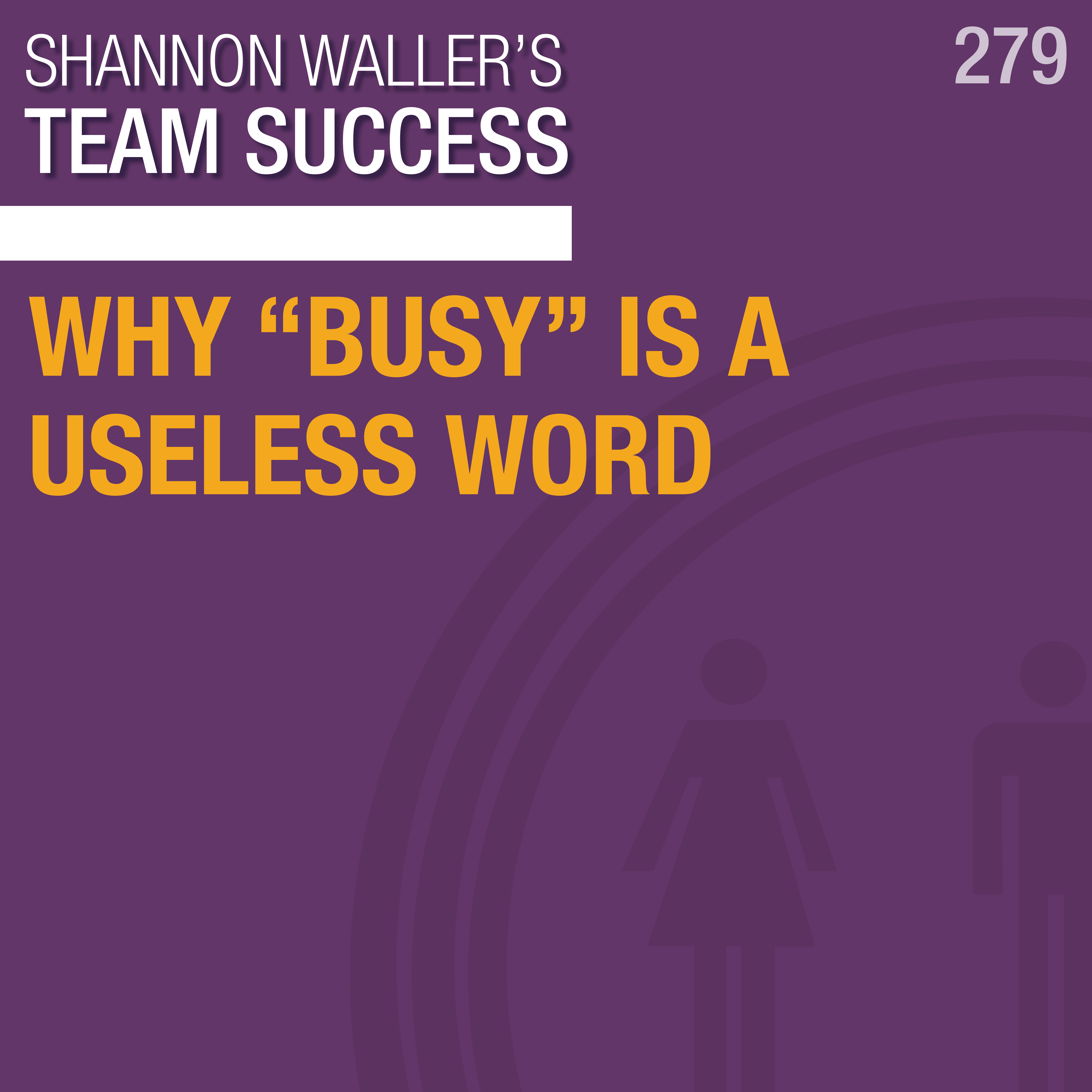
Have you ever noticed that the word “busy” is often used as an excuse and stops further action and progress? In this episode, Shannon Waller tackles this word that’s all too common in our vocabularies, yet is significantly unproductive. Join Shannon on this productive rant to discover why we should eliminate this word from our conversations and how we can communicate more effectively about our time and priorities.
Show Notes:
The Problem With “Busy”
- Busy is a stop sign in conversations, offering no real information or specificity.
What “Busy” Really Means
- When we say we’re busy, we’re often saying something isn’t a priority for us.
“Busy” As A Statement Of Overwhelm
- Recognize busy for what it often is—a statement of feeling overwhelmed.
- What is truly overwhelming us? Let’s address those specific issues.
The Cultural Implication Of “Busy”
- Society often pressures us to appear busy as a badge of honor. But being busy doesn’t equate to being productive or profitable.
- “A tightly scheduled entrepreneur cannot transform.” Dan Sullivan
“Busy” As An Excuse
- Using busy as an excuse can lead to missed opportunities.
- Saying we’re busy may be a less-than-transparent way of avoiding things we don’t want to do.
- Strive for honesty and clarity in your commitments and desires.
Taking Action
1. Productive, Useful Relationships
- When someone labels you as busy, engage in a curious and open conversation to explore why they perceive you that way. This can uncover assumptions and lead to a healthier relationship by understanding each other’s time and priorities.
2. Self-Coaching Through “Busy”
- Feeling busy? Coach yourself through what’s really going on and what’s overwhelming you. Then, reprioritize your commitments to align with your true values, goals, or three crucial results.
3. Communicate Transparently
- “That’s not a priority for me right now” is more authentic and constructive than “I’m busy.”
4. Build In Space To Connect
- Even if you have an “energetic,” lily pad calendar with back-to-back meetings, you can also build in buffer time to reflect, decompress, offload, and check in with people.
We want to hear from you!
Has this conversation about busy struck a chord with you? Do you have strategies for communicating more effectively about your time and priorities? Share your thoughts and experiences with us at [email protected].
21 November 2024, 12:46 pm - 13 minutes 38 secondsHow To Transform Your Organization’s Success With The Unique Ability® Model
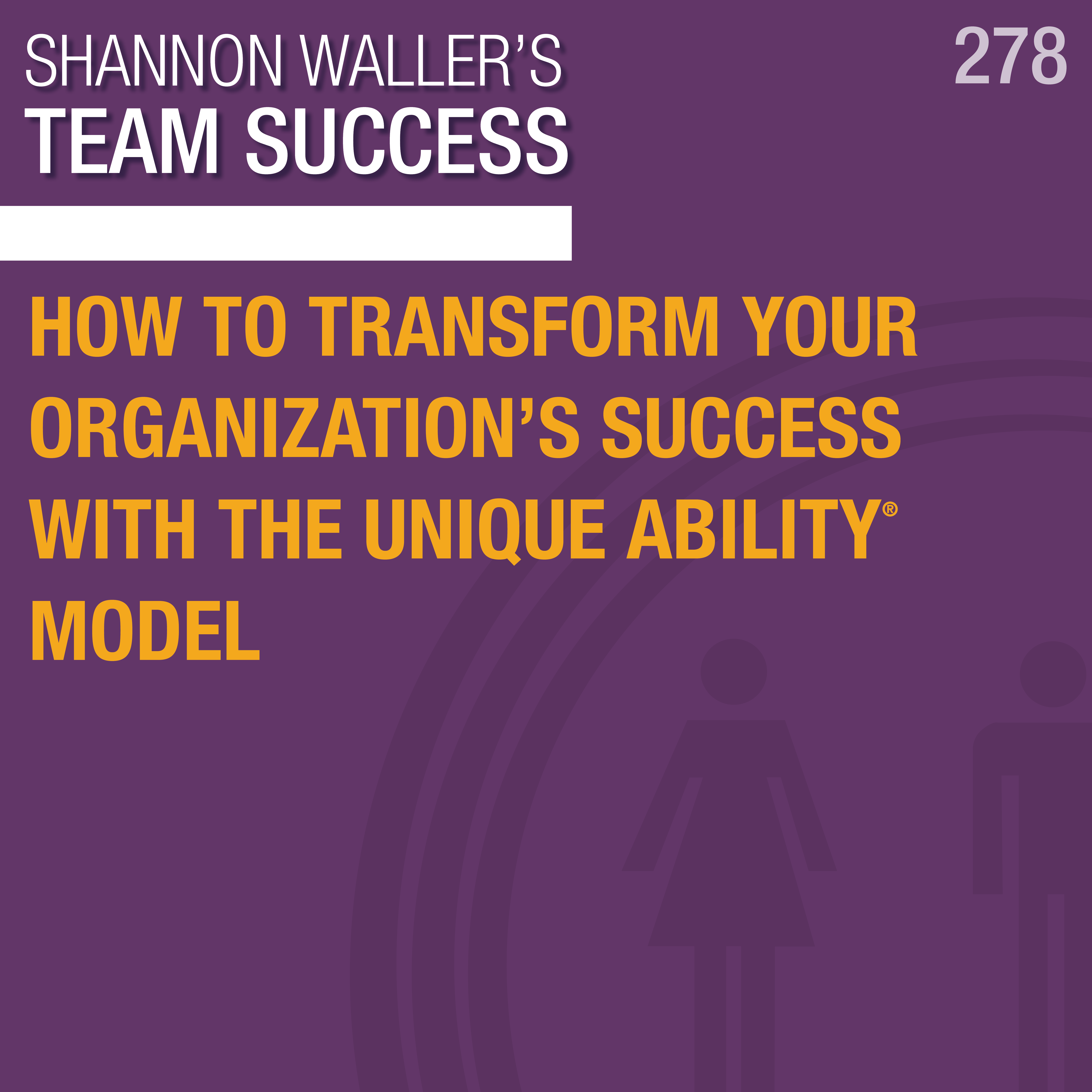
Are you leveraging your entrepreneurial company’s unique advantage? In this episode, Shannon Waller reveals how, by getting your team to focus on activities where they have both superior skill and passion, you can ensure your business is always growing, always innovating, and always multiplying its success—and eliminate boredom and stagnation for good.
Show Notes:
- Entrepreneurial companies have a distinct advantage over bureaucratic organizations because of their flexibility, innovative spirit, and capacity to cultivate a culture that prioritizes individual strengths and passions over conformity and rigid ways of thinking.
- This culture is founded on the Unique Ability® model, which consists of four levels: incompetent, competent, excellent, and unique capabilities, with unique being the most impactful. Here’s what they mean:
- Incompetent: These tasks are areas where team members struggle to achieve results, often leading to negative impacts. Entrepreneurial companies can minimize time spent on these activities, allowing them to concentrate on more productive endeavors.
- Competent: While team members may perform adequately in these areas, they often only meet minimum standards. In bureaucratic settings, employees may feel compelled to remain in this zone due to comfort and familiarity, but this does not foster growth or innovation.
- Excellent: At this level, team members demonstrate superior skills, leading to effective teamwork and often financial rewards. However, remaining in this zone for too long can result in stagnation, as people may become bored and less engaged.
- Unique: This is where the true potential lies. Areas of Unique Ability combine superior skill with passion, resulting in high energy, motivation, and creativity. Entrepreneurial companies have the opportunity to help their teams focus on these abilities, which can lead to significant competitive advantages
- If you want to maximize your company’s potential for success and innovation, strive to have at least 50% of your team’s time spent in their Unique Ability and the other 50% on excellent abilities.
- It’s also important to eliminate tasks that fall under the “incompetent” category, as these activities cost your company money and limit productivity.
- Procrastination on certain tasks is a sign of incompetence in that area, even if the person technically has the capability to do it.
- To prevent team members from boredom and stagnation, move them away from merely competent tasks as quickly as possible.
- Be aware of the “Excellence Trap,” where team members become too comfortable in their superior skills and resist moving toward their Unique Ability.
- It’s essential for entrepreneurs to foster a company culture that encourages and rewards Unique Ability® Teamwork, as this is where the 10x multiplier effect occurs in terms of productivity and innovation.
- To help shift your team members toward working in their areas of Unique Ability, it’s important to regularly engage in conversations with them about what they excel at and love doing.
- Even minor incompetent tasks can consume significant mental energy. Freeing team members from these tasks is essential for maximizing productivity and creativity.
- It’s important to create flexible systems and job descriptions that allow team members to focus on their excellent and unique capabilities, even if it means creating unconventional role structures.
Resources:
Book: Unique Ability® 2.0: Discovery by Catherine Nomura, Julia Waller, and Shannon Waller
7 November 2024, 2:36 pm - 1 hour 4 minutesSuperpowered: Dismantling The Myths Of Hiring Assistants, with Steven Neuner and Ryan Cassin
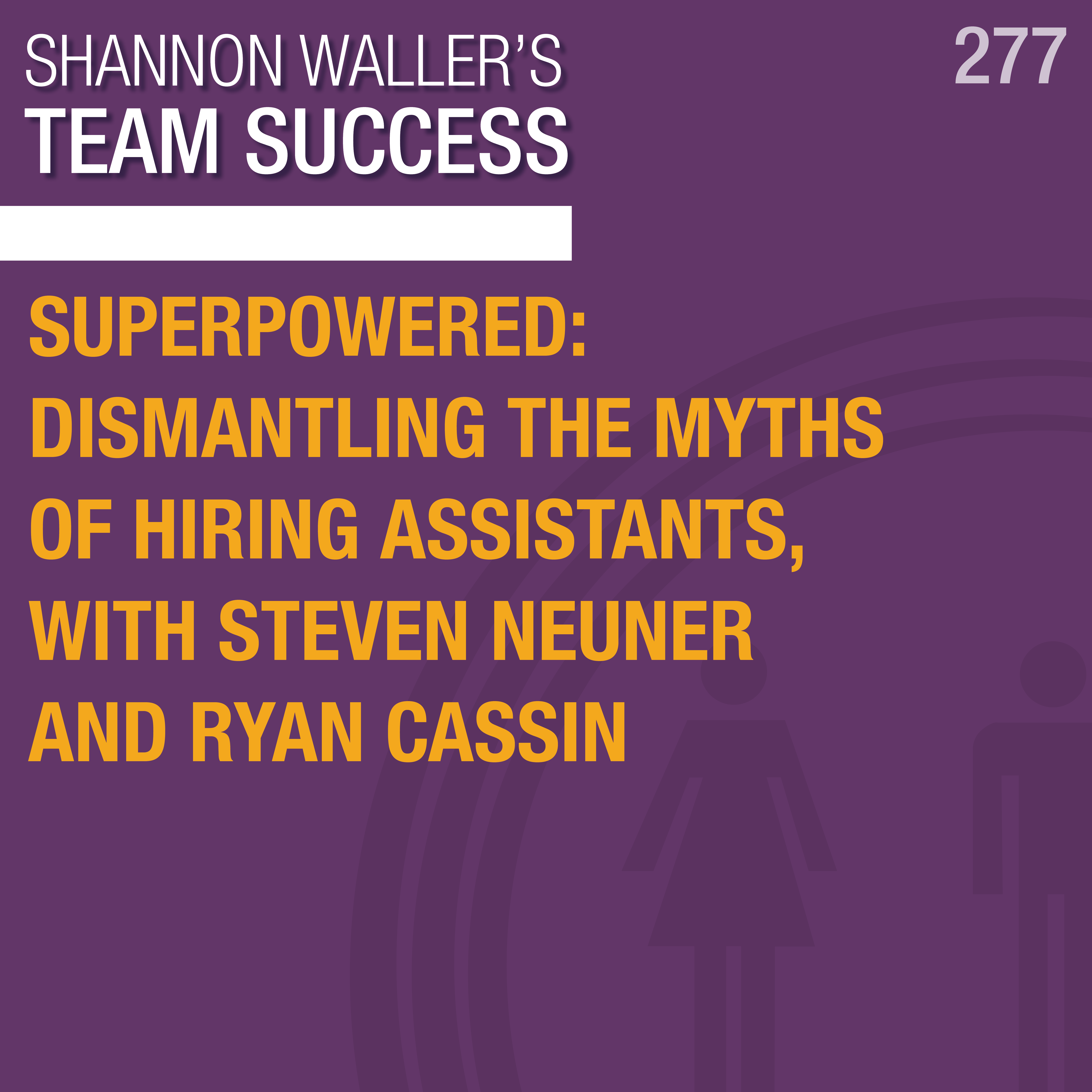
Are you overwhelmed by the daily grind, in a state of “suck,” with an overflowing inbox, double bookings, and a constant feeling of putting out fires? Ever thought about hiring an assistant but not convinced it’s worth the money, time, and effort to bring one on board?
In this episode of Team Success, host Shannon Waller sits down with Steven Neuner and Ryan Cassin, her co-authors of Superpowered: The Secret That Helps Every Entrepreneur Eliminate the Suck, 10x Their Impact, and Have More Fun in Work and Life. Shannon, Steven, and Ryan will shift your mindset about hiring an assistant so you can step out of the chaos and settle on nothing less than 10x growth and freedom.
Resources:
-
- Buy Superpowered: The Secret That Helps Every Entrepreneur Eliminate the Suck, 10x Their Impact, and Have More Fun in Work and Life by Shannon Waller, Steven Neuner, Ryan Cassin
- Sign up for the free Superpowered resources
- Visit Ryan and Steven at superpowershq.com
- Strategic Coach
Show Notes:
Constant State Of Suck
- Many entrepreneurs can end up in a “constant state of fire drill” before they decide to hire an assistant.
- The setup for failure: “Most entrepreneurs show up in the worst possible, least collaborative, lowest energy state to go make one of the most important, most influential, most meaningful hires they’re going to make in their business.” —Steven Neuner
Mindset Shifts Required Before Hiring
- Steven coaches desperate entrepreneurs to shift their mindset to see hiring as an investment of time rather than an investment of money.
- Investing time to grow the relationship with a new assistant pays exponentially higher dividends down the road in both your business and personal life.
- Another important mindset shift is being courageous and vulnerable enough to let someone else see the backstage of your business.
Entrepreneurial Executive Assistant
- This role requires the assistant to delegate and manage up, rather than the other way around.
- The assistant’s Unique Ability® frees you to stay in your own Unique Ability lane.
- Entrepreneurs must think of their assistant as a partner on their growth journey, one in which the assistant will also be growing professionally and personally.
- Entrepreneurial assistants, like entrepreneurs, don’t like getting bored; they will want to lead, take initiative, and be creative in areas outside of your Unique Ability.
The Secret
- Many people think of an assistant as someone to whom they can delegate stuff they don’t want to do.
- The “secret” is that your assistant can be your all-around support partner who can give you superpowers and help you expand what you think is possible.
The Superpowered Scale
- Resignation
- Desperation
- Frustration
- Delegation
- Superpowered
Impact On Entrepreneur Support Partners
- Leveraged support partners find opportunities to respond to challenges, grow, and achieve fulfillment in parallel with their entrepreneur.
- Many support partners grow into new responsibilities, new roles, and new connections in the organization.
- With so much core institutional knowledge, they can also become coaches and trainers for new hires.
Onboarding Process For Support Partners
- First 30 Days: Know You
- Second 30 Days: Understand You
- Third 30 Days: Anticipate You
Don’t Settle For Faux Freedom
- Becoming Superpowered means going beyond the standard level of support to exploring a whole other dimension where 10x growth and freedom are possible.
Read Superpowered: The Secret That Helps Every Entrepreneur Eliminate the Suck, 10x Their Impact, and Have More Fun in Work and Life for practical strategies on leveraging all the capabilities of an entrepreneurial executive assistant so you can expand your own freedoms.
24 October 2024, 11:37 am -
- 10 minutes 45 secondsHiring For Entrepreneurial Success: Avoiding The Corporate Mindset Trap
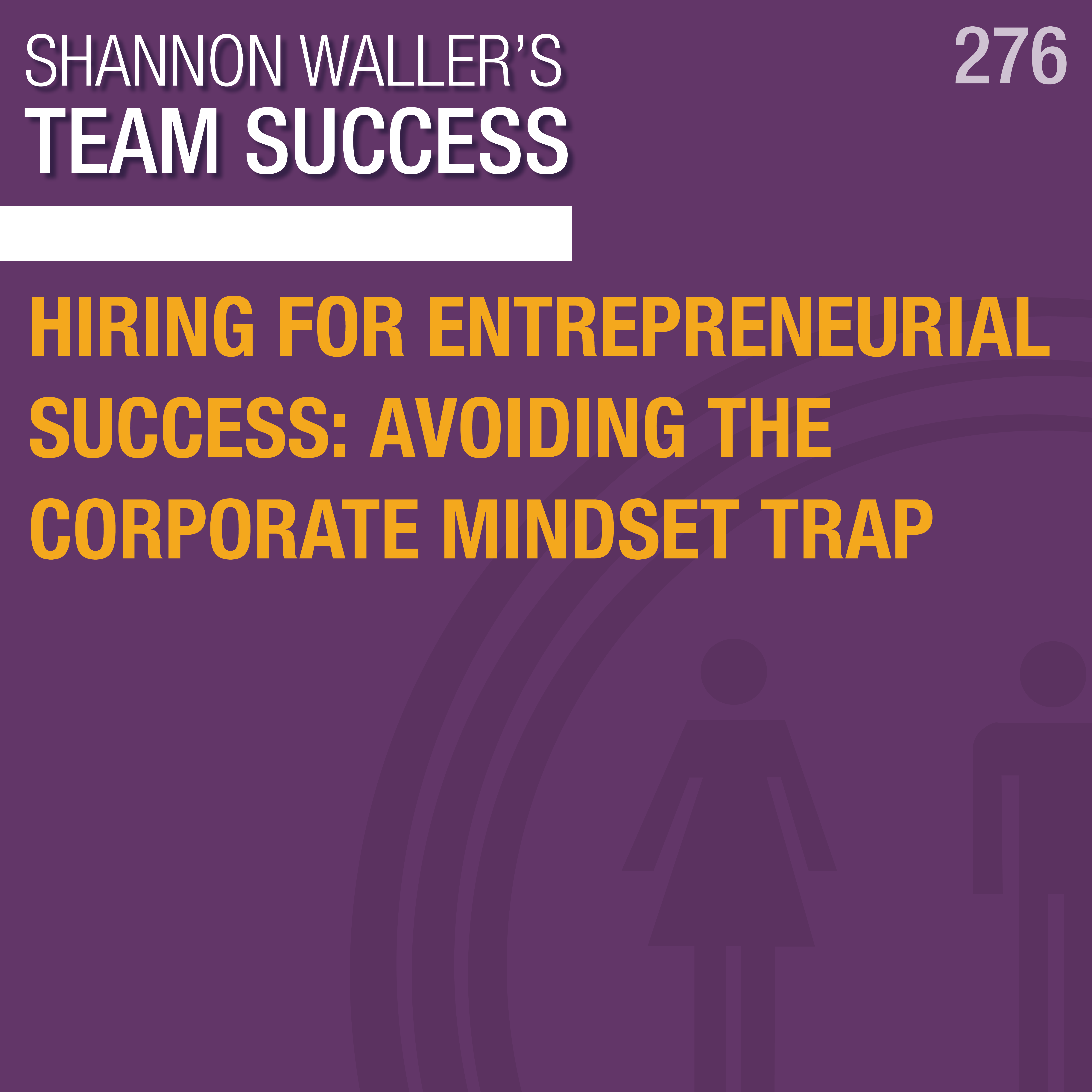
Are you inadvertently sabotaging your entrepreneurial company by hiring corporate talent? In this episode, Shannon Waller reveals the pitfalls of bringing corporate mindsets into entrepreneurial environments. Learn how to identify candidates with true entrepreneurial spirit, ask the right interview questions, and build a team that thrives on innovation, contribution, and rapid growth.
Show Notes:
- Corporate hires can be a risky choice for entrepreneurial companies due to fundamental differences in mindset and work approach.
- The meaning of “responsibility” differs greatly between corporate and entrepreneurial environments.
- Corporate backgrounds often emphasize status and hierarchy, while entrepreneurial companies value contribution above all.
- Red flags in interviews include candidates prioritizing salary, time off, team size, and office location over potential contributions.
- Corporate titles can be detrimental in entrepreneurial settings, as they focus on status rather than results.
- Unique Ability® titles that highlight an individual’s value creation are preferable in entrepreneurial companies.
- When hiring, look for candidates with entrepreneurial backgrounds or experience, such as childhood businesses or side hustles.
- Former corporate employees who felt constrained or stifled in their previous roles may thrive in entrepreneurial environments.
- Entrepreneurial companies offer more freedom, innovation opportunities, and faster-paced environments compared to corporate structures.
- Hiring managers should prioritize candidates excited about contributing to company growth rather than personal status.
- Diversity in thinking and problem-solving approaches is crucial for entrepreneurial teams rather than hiring clones of existing team members.
- Successful candidates should be willing to work independently, be hands-on, and make a direct impact on the business.
- Entrepreneurial companies should emphasize their unique culture and growth opportunities when recruiting to attract the right talent.
- Hiring the right people is challenging but critical for maintaining an entrepreneurial culture and driving business success.
- Entrepreneurs should trust their instincts during the hiring process and be wary of candidates who don’t align with the company’s entrepreneurial spirit.
Resources:
17 October 2024, 1:30 pm - 23 minutes 57 secondsThe Power Of Openness: How Transparency Drives Team Success
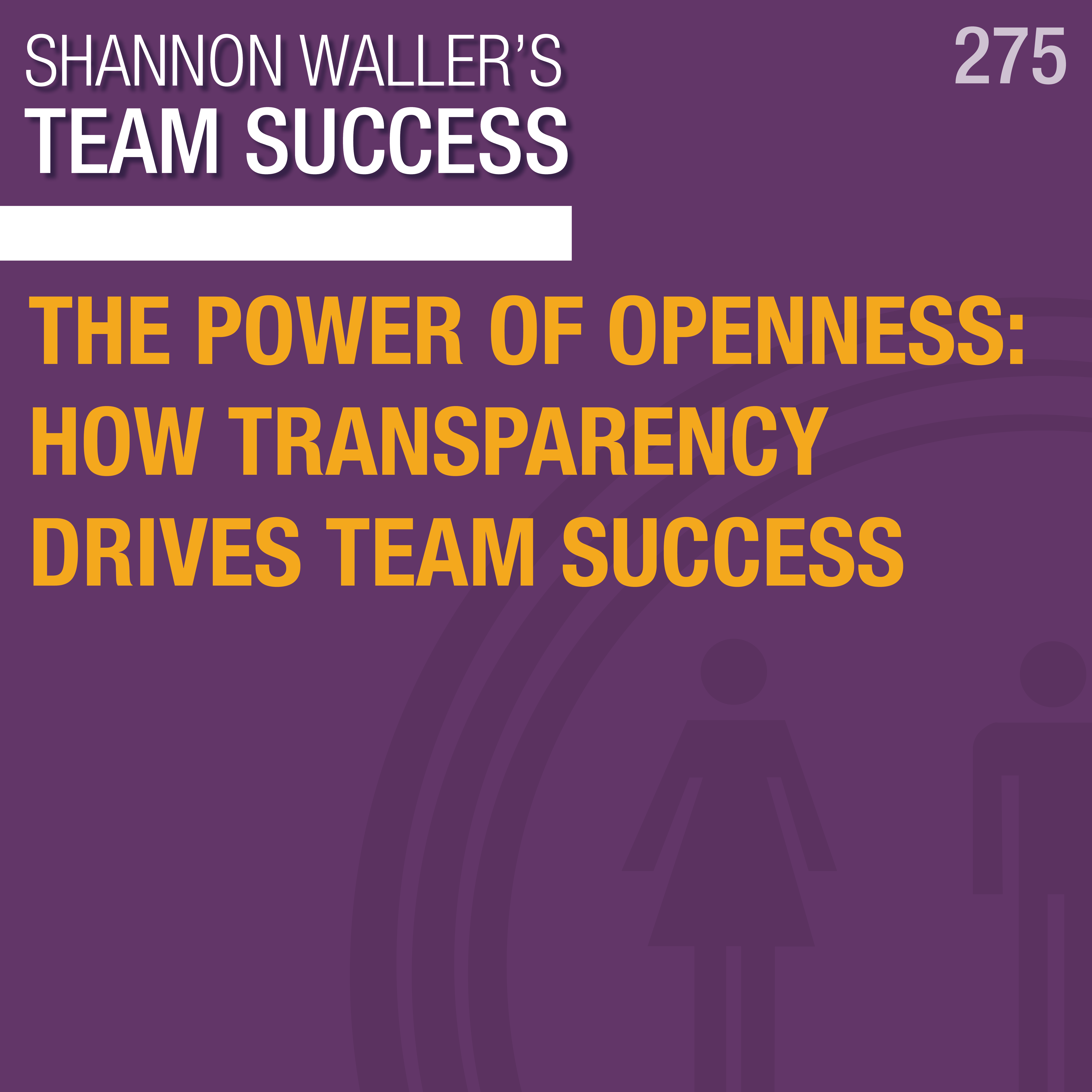
Are you an authentic leader? Do you find it easy or hard to be transparent with your team? In this episode, Shannon Waller discusses the power of authenticity and transparency in leadership. She shares practical strategies to build trust, engage your team, and create psychological safety so that everyone feels safe to express their ideas and take risks. If your team doesn’t seem to take risks, this will be an eye-opening episode to listen to.
Show Notes:
- It’s more important for your team to trust you than to simply like you.
- Being transparent means being open, honest, and authentic without hidden agendas.
- Our brains are wired to perceive threats more than safety.
- Without trust, teams become defensive and stagnant.
- When team members feel safe to take risks and voice their ideas, this leads to greater innovation and success.
- Strategies For Transparency:
- Share insights from leadership meetings openly with your team.
- Provide more information rather than less to avoid misunderstandings: use The Impact Filter™ tool to share your thinking and intentions.
- Explain the reasoning behind decisions and include awareness of the emotional impact on the team.
- Use “I” statements to express your feelings without blaming others.
- Acknowledge your limitations and ask for help when needed.
- Ask open-ended questions without leading toward a specific answer. Be willing to listen genuinely.
- Close the loop on discussions by sharing outcomes and reasoning behind decisions.
- Regularly check in on how team members feel about decisions.
- Stay straightforward and avoid manipulative tactics; focus on solutions instead of creating unnecessary drama.
- Understand your own triggers and emotional responses to better manage interactions with your team.
- Regularly assess where you can improve transparency in your leadership approach:
- Where have you felt like it was appropriate to be open and honest?
- Where do you feel held back?
- Where do you take things personally?
Resources:
EOS®: Entrepreneurial Operating System®
PRINT®: Team Success Podcast, episode 224, “Uncovering ‘The Why Of You,’ With Debra Levine”
3 October 2024, 1:40 pm - 1 hour 22 minutesThe Future Of Sales, with Steve Heroux

In this episode, Shannon Waller and guest Steve Heroux discuss the importance of sales coaching and understanding Sales DNA profiles. Steve addresses the negative perceptions of sales and the challenges entrepreneurs face in hiring effective salespeople, and offers actionable insights to transform sales culture. Tune in for a fresh perspective on finding and nurturing great sales talent!
Show Notes:
- Effective sales coaching is essential for developing a high-performing sales team and should focus on individual strengths and weaknesses.
- Understanding the Sales DNA profile can help identify the unique strengths of salespeople, allowing for tailored coaching and training strategies.
- The sales profession often suffers from a negative perception, with many seeing salespeople as pushy or manipulative, which can hinder effective selling.
- Sales leaders play a crucial role in shaping the culture and practices of their sales teams. Poor leadership can perpetuate negative stereotypes about sales.
- Finding the right salespeople is challenging, which means entrepreneurs must prioritize hiring individuals who align with the company’s values and customer needs.
- One-size-fits-all training programs are ineffective. Custom training based on the Sales DNA profile can lead to better results.
- Trust is a critical component in sales. Building genuine relationships with clients can counteract the negative stereotypes associated with sales.
- Many entrepreneurs struggle with sales because they excel in product development but lack sales expertise, leading to potential business failures.
- Defining an ideal customer profile helps sales teams focus their efforts on prospects that are more likely to convert and benefit from the product or service.
- Teaching salespeople to say no to unsuitable prospects is vital; just because someone is willing to buy doesn’t mean they should.
- Salespeople are motivated by personal goals and family needs. Leaders should align company objectives with these motivations to foster engagement.
- There is a need for a cultural shift in how sales is perceived and practiced, moving away from aggressive tactics to a more consultative approach.
- Providing sales teams with the right tools and resources, including training and technology, is essential for empowering them to succeed.
- The sales landscape is constantly evolving; ongoing training and development is necessary to keep sales teams competitive.
- Focusing on building long-term relationships with clients rather than short-term sales can lead to greater success and customer loyalty.
Resources:
Book: Sales Is Not a Dirty Word: The Definitive Guide for Success in Sales by Steve Heroux
Book: To Sell Is Human: The Surprising Truth About Persuading, Convincing and Influencing Others by Daniel Pink
Book: Start With Why: How Great Leaders Inspire Everyone to Take Action by Simon Sinek
Book: The End of Average: How We Succeed in a World That Values Sameness by Todd Rose
Book: Atomic Habits: An Easy & Proven Way to Build Good Habits & Break Bad Ones by James Clear
23 September 2024, 2:37 pm - More Episodes? Get the App